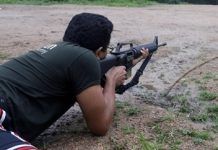The Palestinian Ministry of Interior in Ramallah has begun accepting licensing requests from potential security companies, and has launched a process to regulate existing ones. “The government’s decision to license private security companies is aimed at easing the pressure on the police, because it’s impossible to deploy police officers to guard public places such as parks, shopping places, universities, institutions and banks,” Abdel Nasser al-Sairafi, head of the licensing committee at the Interior Ministry, said.
The official gazette, in May, published information on the new system, which categorizes the nature of services the companies provide, such as guarding and protecting facilities and buildings, individuals, valuables, movable and immovable property and any other services approved by the Interior Ministry. Companies can request a license from the Interior Ministry after registering at the General Directorate of Companies at the Ministry of Economy. The Interior Ministry will decide within 30 days whether to approve a request. Licenses are valid for two years.
The set of conditions for granting licenses includes: A company must be owned by a Palestinian residing in Palestine and holding at least 51% of the company’s capital, owners must have a clean record and obtain a certificate of good conduct from the Interior Ministry, and the business must register as a public ordinary company with the Ministry of Economy and comply with any instructions issued by the Interior Ministry.
Employees also must be of Palestinian nationality, have a certificate of good conduct from the ministry and have no record of felonies or misdemeanors. They cannot be public servants and must take courses in security services provided by a ministry-approved entity. Employees must be at least 18 years old.
Hemaya Security Solutions Director General Tariq Kandah said that before the system was established, security companies operated without any uniform legal parameters for their specific work, but rather observed the Ministry of Economy’s general laws for companies and licensing. The new system specifies uniform colors and basic designs, types of vehicles and identifying markers.
Kandah believes the system will reflect positively on the nature of security companies’ work. “Now that the Ministry of Interior is in charge of licensing private security companies, institutions will trust us and hire us to handle their security,” he said. Speaking about private security companies’ rights to use firearms, Kandah said that these firms — especially those in charge of public places such as shopping centers — don’t need weapons, as security guards are only in charge of preserving order. He said only security companies transporting cash require weapons.








